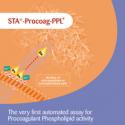
Midway between plasma haemostasis and cellular haemostasis are microparticles rich in procoagulant phospholipids. Increased procoagulant activity features in many diseases, including:
- cardiovascular diseases,
- certain types of cancer,
- inflammatory syndromes,
- infectious diseases,
- obstetric complications, etc.
STA®-Procoag-PPL, an easy to use standardised automated test, can be used to measure changes in procoagulant activity, facilitating study of this activity. phospholipids.
Procoagulant activity comes from phospholipids present at various sites:
- circulating microparticles
- activated platelets
- activated red and white cells.
This test has numerous benefits :
- Rapid: < 4 min
- Easy to use
- Excellent reproducibility
- Flexible: suitable for testing samples individually or in series
- Close to physiological characteristics: it may be used in PPP (platelet-poor plasma), PRP (platelet-rich plasma) or whole blood to investigate all sources of procoagulant phospholipids.
Results are expressed as coagulation times: the shorter the coagulation time the greater the procoagulant activity of the phospholipids being studied.
This new marker may be of value in:
- diagnostics, as a pre-thrombotic marker
- prognostics, as an early marker for certain diseases
- therapeutics, as an indicator for monitoring of anticoagulant therapy.
Thus, with STA®-Procoag-PPL, Stago adds to its range of flow cytometry and thrombin generation reagents for microparticle analysis.
